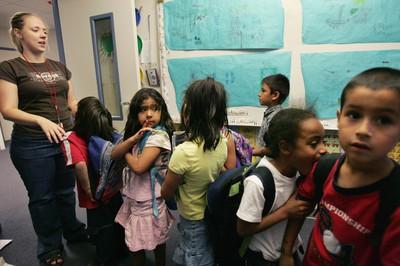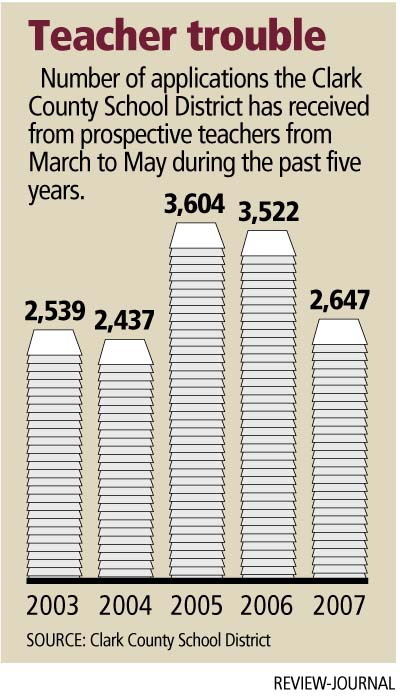1,163 vacancies to fill


The Clark County School District is short more than 1,100 teachers for the upcoming school year, almost twice the number of instructors it needed to hire at this point in 2006.
District officials are not yet saying the problem has reached a crisis, but they anticipate that schools might begin the upcoming year with at least as many teaching vacancies as fall 2006. That would mean a second consecutive year with more than 340 substitutes leading classrooms instead of licensed teachers.
“I don’t want to be the bearer of gloom and doom, but we’ll see similar shortages this year as last year,” Superintendent Walt Rulffes said Friday.
“The real ingredient of having a good education is having a quality teacher. The state has to recognize that if we want a good educational system, someone has to pony up the extra dollars” for more teachers, Rulffes said.
District officials announced Friday that they are short 1,163 teachers as of June 11.
The district was short 635 teachers as of June 23, 2006. It began the 2006-07 school year short 344 teachers and had between 400 and 450 vacancies for most of the school year.
The shortage is severe despite year-round efforts in hiring that includes recruiting in 39 states and 122 cities.
Rulffes said the two biggest factors contributing to the teacher shortage are the high cost of living and a low starting salary.
The district’s starting salary is $33,000 for prospective instructors without any teaching experience. Those teachers also receive a $2,000 signing bonus.
Making the outlook even more bleak is the fact that the district has received about 900 fewer applications from prospective teachers in March through May than it did last year in those months. It has only hired 569 teachers as of June 11. The district has hired about 3,000 new teachers in each of the past two school years to keep up with the growth of the school system.
The district is one of the fastest growing and fifth-largest in the nation with about 303,000 students. It is expected to grow by another 11,000 students and open 11 new schools in the fall.
John Jasonek, executive director of the Clark County Education Association teachers union, said the quality of education in the district will suffer if hundreds of substitutes are needed in the fall.
He said Nevada’s politicians should be held accountable for the perpetual teacher shortage in Southern Nevada.
While teachers must have a minimum of a bachelor’s degree and a teaching credential to teach in Nevada, substitutes only need to have a minimum of 62 college credits, six of which are in educational courses.
“It’s a foregone conclusion that you’re not going to get the same quality of education with a substitute as a permanent teacher,” Jasonek said. “This isn’t a school district issue. This isn’t a teachers union issue. This is a legislative issue. They shouldn’t be given a free pass.”
Nevada’s 17 county schools superintendents asked for a 5 percent raise for each of the next two school years for teachers. The Legislature that adjourned last week approved funds to give teachers a 2 percent raise the first school year and at least a 4 percent raise the next school year, the same raise that was approved in the 2005 legislative session.
But state Sen. Barbara Cegavske, R-Las Vegas, who is vice chairwoman of the Senate Human Resources and Education Committee, said district officials should look at themselves when trying to figure out who is to blame for the teacher shortage.
Cegavske said district officials and Nevada’s superintendents asked for full-day kindergarten and the state granted them their request by allocating $15 million for expansion of the program.
“That’s where the money went,” Cegavske said. “If you have a shortage, why would you add more programs?”
“They want these things and they don’t have the room or the teachers,” she said.
The district is expected to roll out full-day kindergarten at an additional 39 schools for the 2008-09 school year.
Assemblyman Mo Denis, D-Las Vegas, a member of the Assembly Education Committee, said he would have loved to give 5 percent raises to teachers, but the state’s pool of resources was too shallow.
“We do support teachers and want to do what we can to attract teachers and help with the shortage,” Denis said. “We did our best with the issue, but there wasn’t enough money there.”
Anne Christensen, a first-year kindergarten teacher at Hollingsworth Elementary School in Las Vegas, said despite the grumbling about low teacher pay in the district, she actually chose to work in the school system because the district offered more than other school systems in Idaho, where she recently graduated with a bachelor’s degree in elementary education.
“One of the reasons I came here was the pay,” Christensen said. “The school district also has a good reputation for being able to advance one’s career.”
Christensen said another factor that might contribute to the teacher shortage is the large classroom sizes teachers have to cope with. Christensen said kindergarten classrooms at Hollingsworth have between 20 and 30 students.
Christensen’s colleague, Genny Castillo, also a first-year kindergarten teacher, said low pay is the number one factor keeping teachers away from Clark County.
Castillo, who recently earned her master’s in education at the University of Nevada, Las Vegas and was hired in August, said her salary will increase $7,000 to $40,000 because of her additional studies.
Rulffes said he would like the starting pay for starting teachers to be $40,000 in order to compete with other districts.
“A lot of people aren’t going to relocate if the pay is low,” Castillo said. “I had to get my master’s to get a decent raise.”












